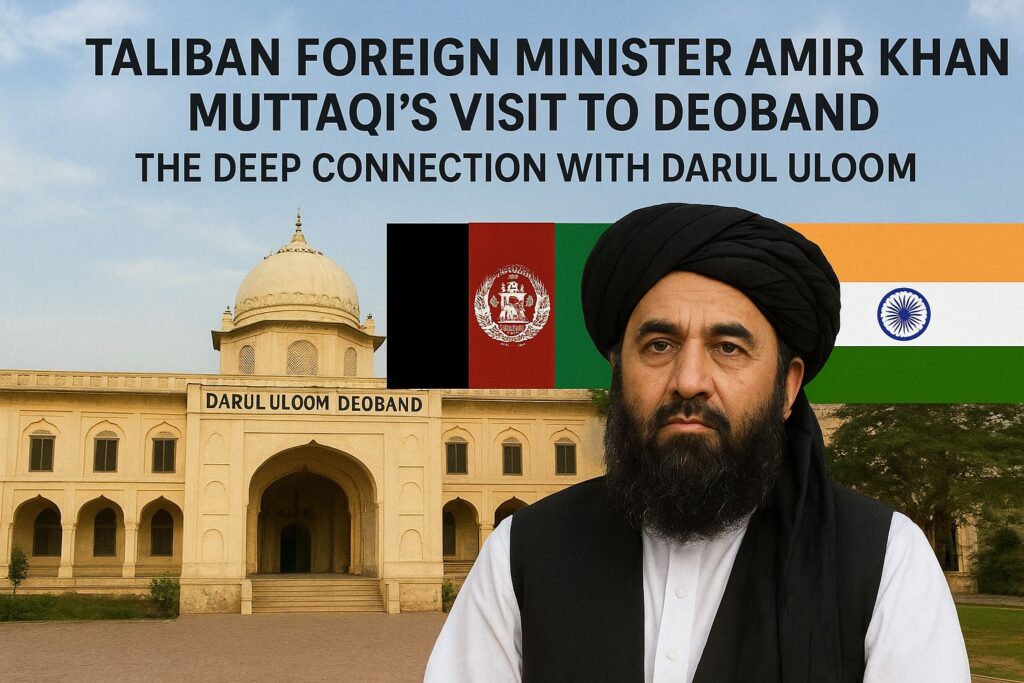
In a surprising and symbolic move, Afghanistan’s Taliban government Foreign Minister Amir Khan Muttaqi recently visited Darul Uloom Deoband, one of the most influential Islamic seminaries in India. His visit sparked curiosity and debate across South Asia why did a senior Taliban leader come to Deoband, and what is the connection between the Taliban and this historical institution?
Darul Uloom Deoband: A Pillar of Islamic Scholarship
Founded in 1866 in the town of Deoband, Uttar Pradesh, India, Darul Uloom Deoband has been a center of Islamic learning and reform for over 150 yearsIts mission was to preserve Islamic education and identity under colonial rule while promoting moral discipline and spiritual revivalOver time, the Deobandi school of thought expanded beyond India, influencing thousands of seminaries across Pakistan, Bangladesh, and Afghanistan

The Ideological Link: Taliban and Deoband
The very word Taliban means students of knowledge in Arabic.The movement originated among students of Deobandi-inspired madrasas in Pakistan and Afghanistan during the late 1980s.Many of the Taliban’s founding members including Mullah Omar studied at DarulThis shared intellectual and religious foundation makes Deoband an ideological ancestor to the Taliban movement, even though the two operate in very different contexts.
The Purpose Behind Muttaqi’s Visit
Muttaqi’s visit to Deoband is not merely religious it carries political and diplomatic undertones.While India has not formally recognized the Taliban government, it has continued to send humanitarian aid to AfghanistanBy visiting Deoband, Muttaqi may be attempting a form of “soft diplomacy” — leveraging shared religious heritage to open communication channels with India and reshape perceptions.Such a visit also signals the Taliban’s desire to gain moral legitimacy within the South Asian Muslim community by associating with one of Islam’s most respected educational centers.
DIGI MERCH STORE PRINT ON DEMAND

Deoband’s Neutral Stance
Despite the ideological connections, Darul Uloom Deoband maintains strict neutrality in global politics.The institution has repeatedly clarified that it is not aligned with any government or political movement, including the Taliban.Its mission remains rooted in religious education, ethical conduct, and unity among Muslims, rather than political activism
Analysis: Symbolism Over Strategy
Amir Khan Muttaqi’s Deoband visit is primarily symbolic — an attempt to show respect toward the source of the Taliban’s religious ideology.It also reflects the Taliban’s efforts to portray a more moderate image on the international stage.For India, the visit serves as a reminder of the complex intersections between religion, diplomacy, and security in South Asia.
Key Takeaways
Darul Uloom Deoband is a globally respected Islamic seminary founded in 1866 The Taliban’s ideological roots trace back to the Deobandi school of thought Muttaqi’s visit represents both religious reverence and diplomatic outreach Deoband remains apolitical, focused solely on education and spirituality The visit could mark a new phase of cultural dialogue between India and Afghanistan
TalibanIdeology. YouTubethumbnails
DarulUloomHistory. LatestGadgets
Afghanistan-IndiaRelations. socialmediaposts
TalibanDeobandConnection. watchedvideos
AmirKhanMuttaqiIndiaVisit. GraphicReports
Comment















